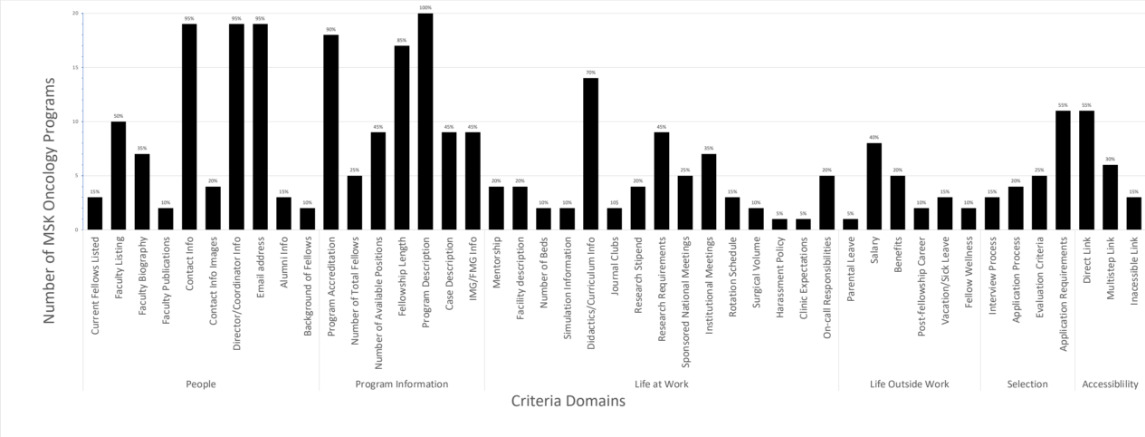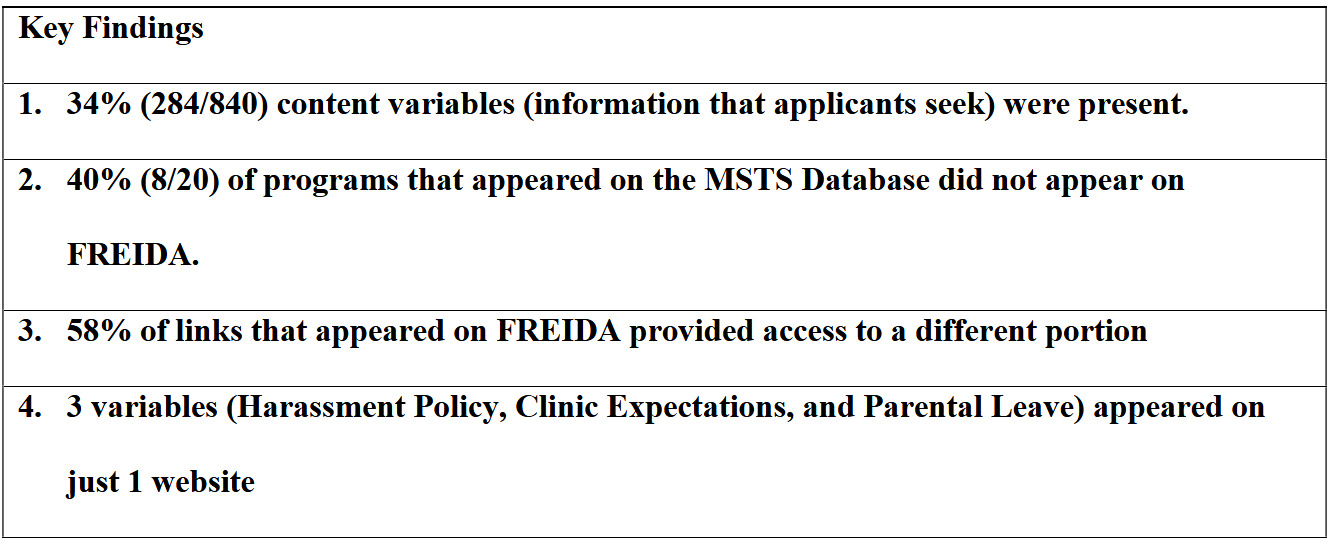Introduction
Musculoskeletal Oncology (MSK Oncology), also known as orthopedic oncology, is a subspecialty of Orthopaedic Surgery. Applicants to fellowships regularly utilize websites throughout their process of choosing a program.1,2 This can be expected to become more frequent given the shift to a virtual world during and after the COVID-19 pandemic. With social media and online content being increasingly utilized for educational and healthcare purposes, and in-person interactions being more limited,3,4 it is crucial that program websites provide accurate and comprehensive information for prospective applicants to make informed decisions. Applicants use these websites to learn about a program’s curriculum structure, the background of faculty, accreditation status, compensation, benefits, and other important factors. This information ultimately influences applicants when choosing their preferred programs and submitting their rank order lists.1,2,5 A previous study published in 2017 assessed combined MSK Oncology fellowships along with adult reconstructive hip programs.6 Previous studies have evaluated the MSK Oncology fellowship using fewer than ten criteria domains, and none have performed a comprehensive analysis using 45 criteria domains as in this study.7 The purpose of this study is to evaluate the utility of MSK Oncology fellowship websites and to identify any areas for improvement. To our knowledge, this is the first comprehensive study to analyze MSK Oncology fellowships using 45 criteria domains.
Methods
Studies have evaluated orthopedic surgery residency websites and orthopedic surgery fellowship websites.6,7 20 MSK Oncology programs were identified using two public databases, the Fellowship and Residency Electronic Interactive Database (FREIDA) and the Musculoskeletal Tumor Society (MSTS). 45 criteria domains were allocated into 6 larger more encompassing categories. For example, the criteria domains “interview process and dates,” “application process,” “evaluation criteria,” and “application requirements” were grouped under the category “selection process”. Private databases requiring membership such as the American Academy of Orthopedic Surgery (AAOS) fellowship directory were not used. Two databases were used to ensure that all MSK Oncology programs were identified. Databases were cross-referenced to ensure that links returned the same results. No MSK Oncology programs found within these 2 databases were excluded from the analysis. These domains are valuable information that applicants seek. Each of the 20 programs was independently evaluated by two authors and analyzed for agreement by the senior author. In addition to evaluating the 20 programs upon 45 criteria, this study also evaluated the presence of the program on the first page of results on Google, one of the most common search engines. Search phrases of the 20 “institution or program name” and “musculoskeletal oncology” or “orthopaedic oncology” and “fellowship” was conducted on a private browser to ensure accurate results.
Results
It was found that MSTS displayed 20 programs and that FREIDA only displayed 12 of the 20 (60%) programs found on MSTS. Additionally, upon cross-referencing the 12 programs found on the FREIDA, 7/12 (58%) provided links that accessed different portions of the fellowship’s website compared to the links provided by the MSTS. Of the 20 MSK Oncology identified from both FREIDA and MSTS, 17/20 (85%) programs provided accessible and correct links. The 3 programs with nonfunctional links in the databases were accessed through Google to complete the analysis. 20/20 (100%) programs had a functioning publicly accessible website. Using the search phrases of the “program’s name” along with “musculoskeletal oncology” and “orthopaedic oncology,” 20 (100%) of the programs appeared on the first page of the results.
The 6 larger categories featured differing numbers of criteria domains with the largest being 15 domains for “Life at Work” and the smallest being “Accessibility” with 3. The 3 criteria domains that were most commonly present were “program description,” (100%) “program director or coordinator information,” (95%) and “contact email address for the program” (95%). The 3 criteria domains that were only present at 1 program of the 20 programs were “harassment policy,” “clinic expectations” and “parental leave”. The average criteria domains present across all programs was 34% (284/840). Accessibility variables were analyzed separately. 11/20 (55%) programs had “direct links” meaning they went directly to the specific program’s website and 6/20 (30%) had “multistep links” which required multiple clicks to reach the respective program. 3/20 (15%) had links that were non-functional. An agreeability of κ = 0.844 ± 0.120 was found between evaluators across all content domains. Table 1 provides a comprehensive list of these results.
Discussion
This study evaluated 20 MSK Oncology fellowship program websites upon 45 criteria domains.
Programs were found to have limited information (34%) on their websites. Because choosing a MSK Oncology fellowship is a huge commitment and sacrifice, applicants typically like to know more about the people that are training or have trained at each program.8 Under the “People” category, programs could have included more information about the current fellows and their training background, the publications of faculty, and descriptions of their alumni. These values ranged from only 10% to 15% present (Table 1). Access to these details allow applicants to reach out to these personnel to learn more about the program and ask specific questions. This information also gives applicants an idea of how successful a program is at securing fellows employment after their training. In the “Life at Work” category, surgical volume was missing from 18 of the 20 programs. MSK Oncology is a year-long fellowship and during this time, fellows are looking to gain advanced surgical knowledge. Understanding a program’s surgical volume can be valuable for applicants in their decision-making process. Additional information in the “Program Information,” “Life Outside Work,” and “Selection” categories had opportunities to include more information for program websites. In an increasingly virtual world, accelerated by the COVID-19 pandemic, it is important that programs respond to the needs of their applicants. By providing more information to applicants regarding the program’s personnel, description, selection process, and life at work and outside of work, applicants will be allowed to make more informed decisions.
Some additional key findings include differences in the number of programs found within commonly utilized databases along with the programs having different links. For applicants to determine a rank order list that truly suits their career, personal, and geographic preferences, it is important they be aware of all the programs available to them. For prospective applicants to MSK Oncology, it is important to understand that 40% of the total number of programs do not appear on FREIDA. Additionally, 58% of links on FREIDA yielded different program pages compared to MSTS for the same program. This ultimately will support prospective fellows throughout their process of choosing their preferred programs.
This study has limitations. The nature of the analysis, despite the strong Cohen’s agreement between two independent authors, is subjective. Additionally, the 45 variables were aggregated based on previous studies and surveys where applicants expressed what is important to them.5–7 It is possible that some of these criteria domains are not as valuable as others and that some important domains have not been included. Finally, this study followed a cross-sectional design at a single time. It is possible that a program’s website underwent changes after this analysis which may limit the true representation of these results. Table 2 summarizes the key findings from this assessment.
Conclusion
MSK Oncology programs were found to have limited comprehensiveness and accessibility. While it is not essential that each of the 45 criteria domains be assessed by each program, updating key information, and ensuring links be functional are simple steps that require minimal effort and assist applicants with program ranking. With the internet being one of the most convenient ways that fellowship applicants learn and choose their programs, MSK Oncology programs are highly encouraged to address areas with deficiencies and ultimately improve these internet resources for their prospective fellowship applicants.
Acknowledgements
N/A
Funding Sources
None
Conflicts of Interest
None
Consent Statement
N/A
Corresponding author
Mahfujul Haque
15 Michigan St NE,
Grand Rapids, MI 49503
Email: haquema4@msu.edu
Post Script
All authors listed agree to the publication of this manuscript.




